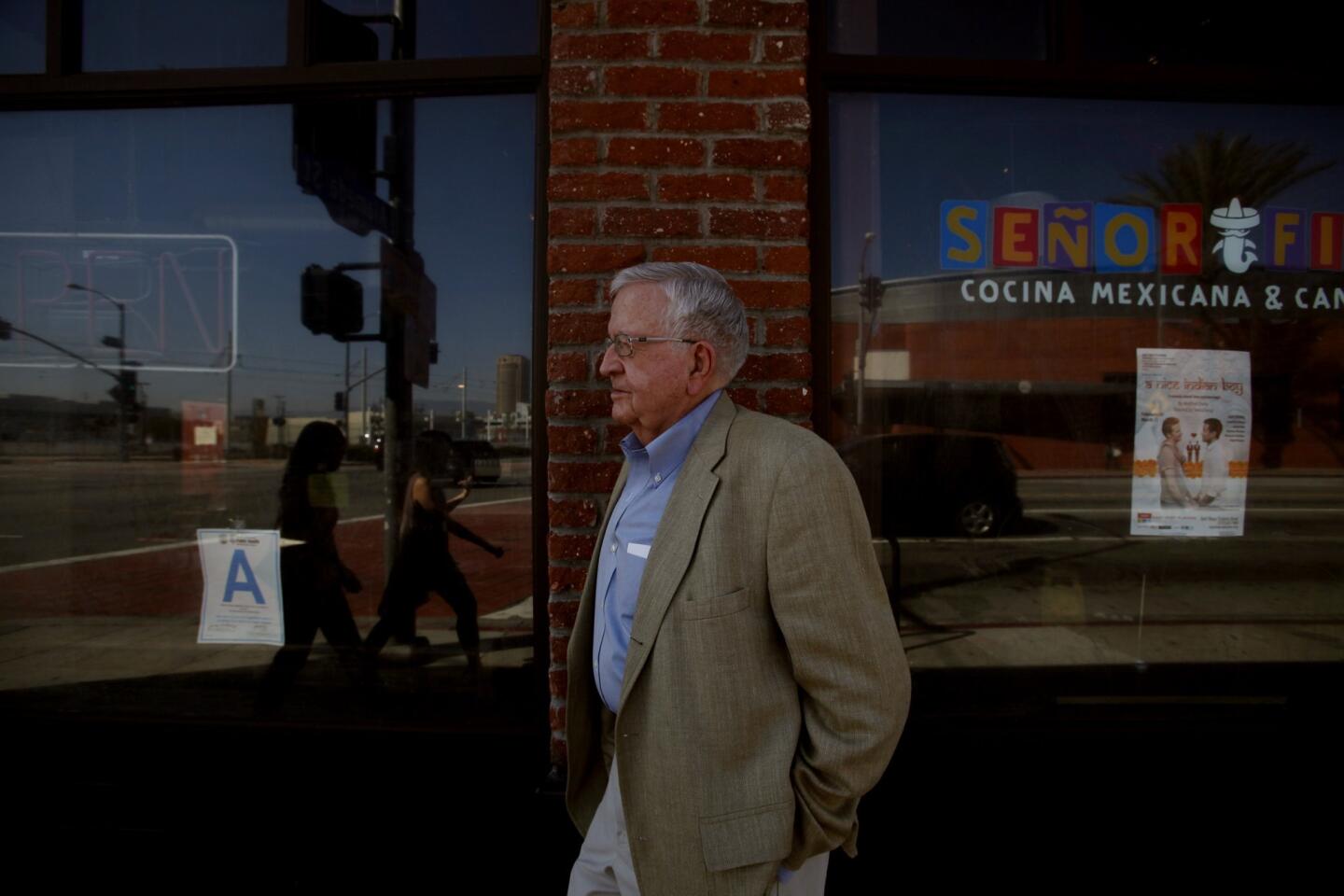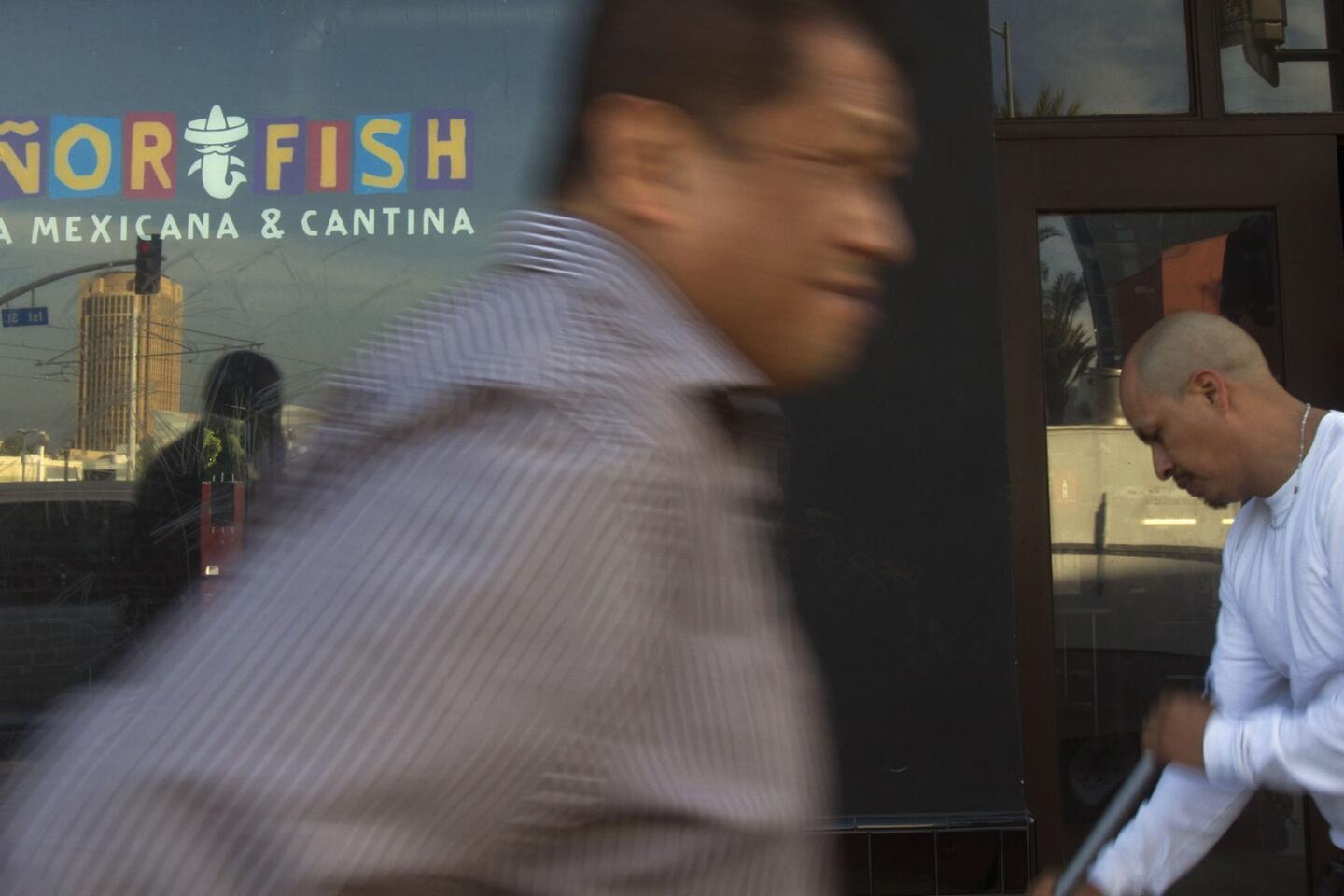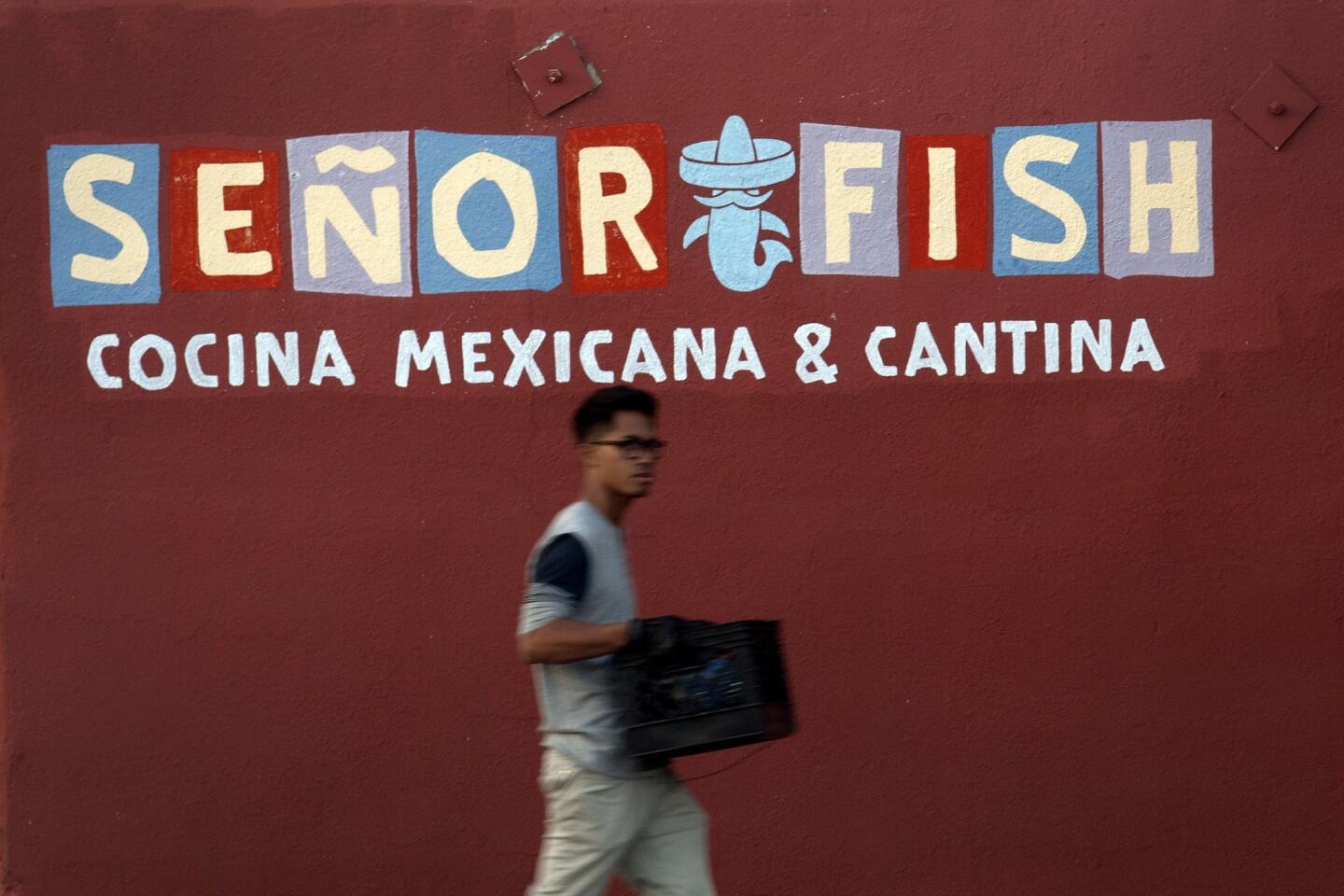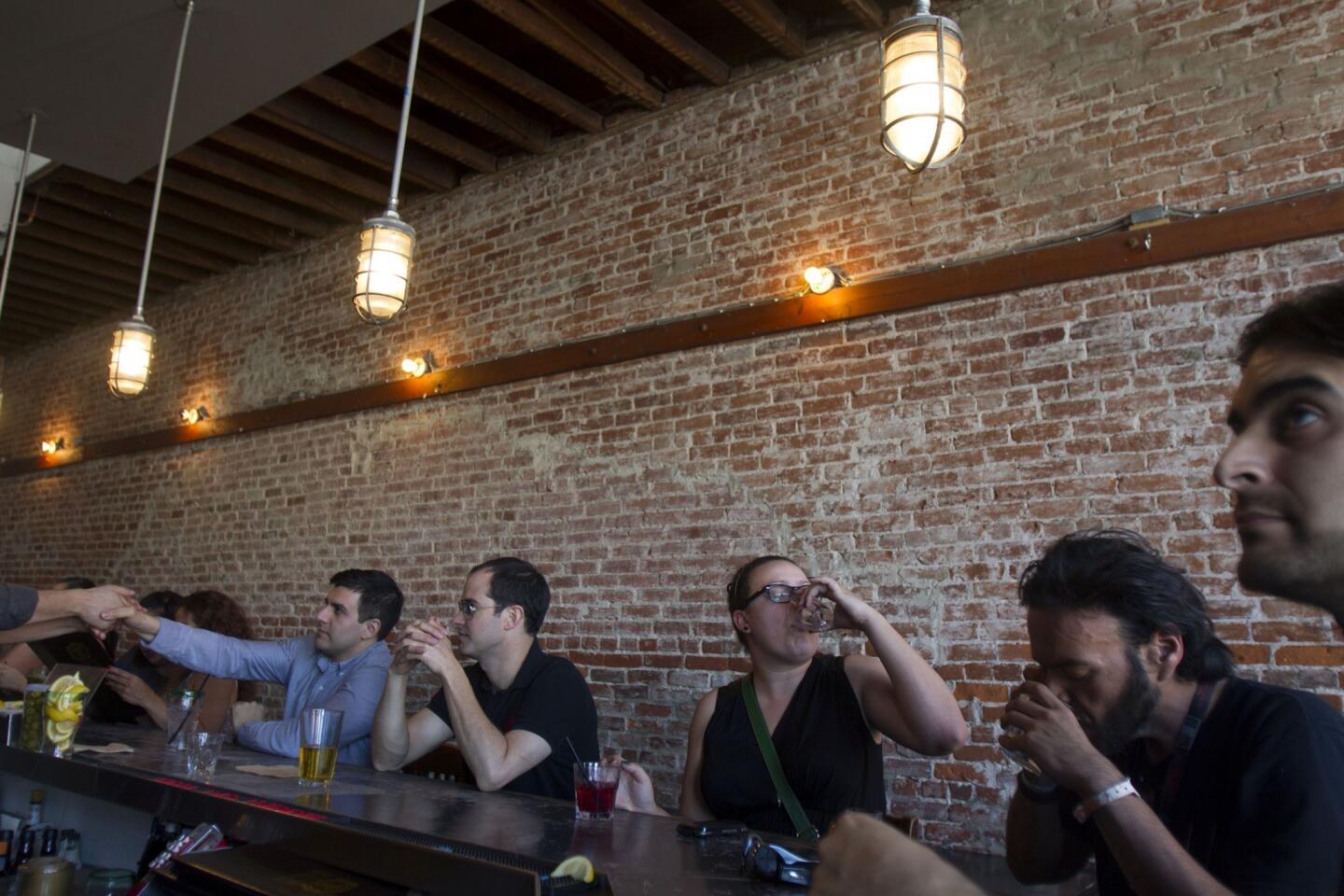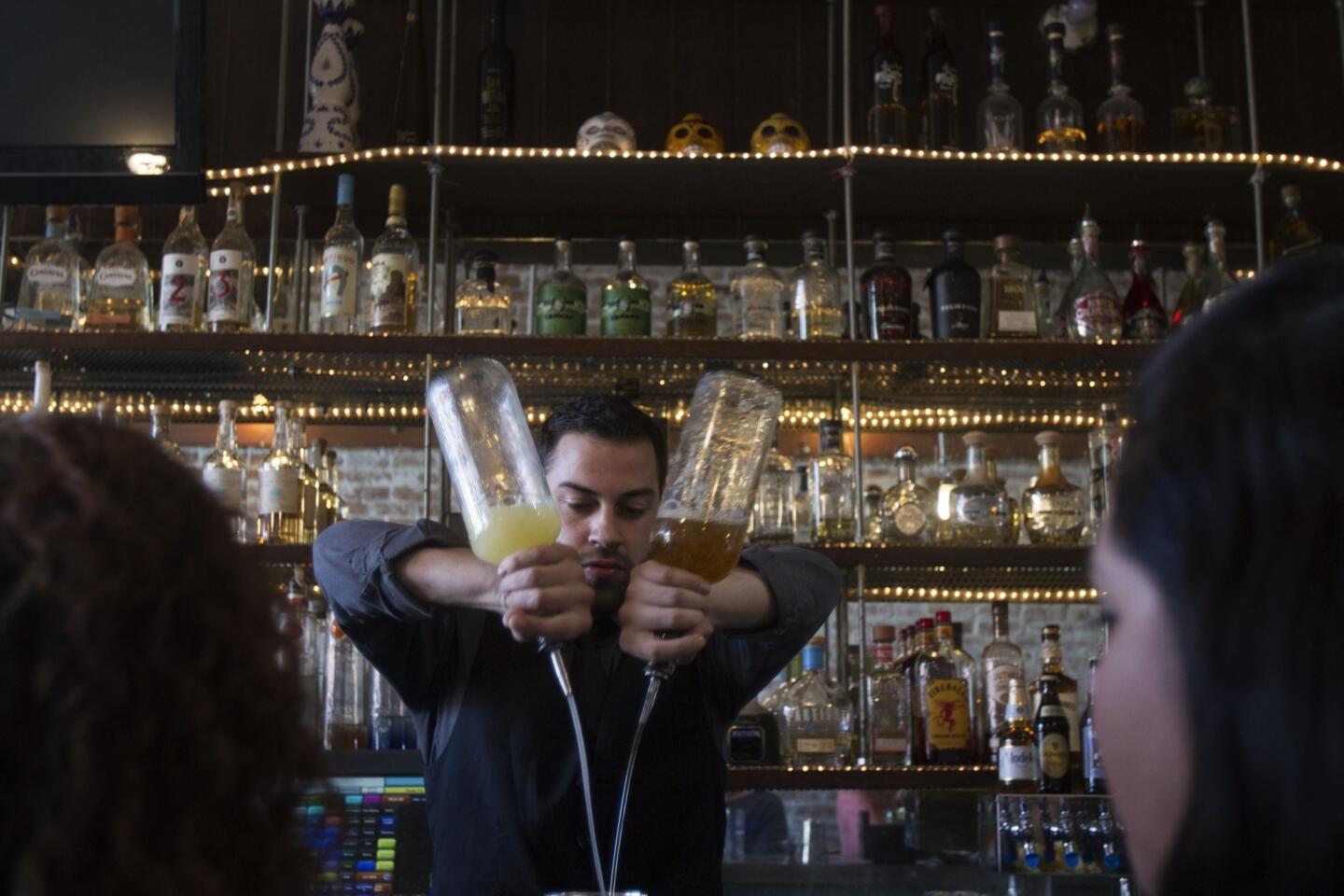Buildings slated for tear-down were rich part of Little Tokyo history
- Share via
Nearly a decade ago, Enrique Ramirez welcomed the opening of a light-rail station in Little Tokyo, just a quick walk from his Mexican seafood restaurant.
The Metro Gold Line station delivered a steady stream of customers to Senor Fish, especially on weekends. But now, with the region’s rail system expanding again, the Metropolitan Transportation Authority is pushing him out.
On Saturday, Senor Fish abandoned its location at the corner of 1st and Alameda streets. And later this year, Metro is set to demolish the property’s two brick buildings, which are located across the street from the Japanese American National Museum and have played an important role in the cultural life of the neighborhood for decades.
In the 1990s, the restaurant building was home to the Troy Cafe, a coffeehouse that showcased indie rock bands, cabaret acts, jazz trios and the enigmatic singer-songwriter Beck — son of one of the cafe’s owners. Prior to that, it was the Atomic Cafe, a favorite after-hours hangout for musicians, artists and writers.
Nancy Sekizawa, or “Atomic Nancy,” made sure the jukebox played the 45s of local punk bands. She said her patrons included Debbie Harry of Blondie, the female rock band the Go-Gos and David Byrne of the Talking Heads, who ordered egg foo yung and a glass of milk.
The rear building once housed the Weiland Brewery, which had a warehouse and offices on the site more than a century ago, said Robert Volk, whose family owned the property for more than 130 years. That part of downtown had multiple breweries at the time.
“The story [of the property] touches so many different lives and crosses so many histories and ethnicities and generations here in Little Tokyo,” said Remy de la Peza, senior planner with the Little Tokyo Service Center, which is helping to document the site’s history. “So we’re sad that that physical space is going to be gone.”
Metro went to court to obtain the property from Volk using eminent domain last year, forcing the removal of Senor Fish and two other businesses — a pub with the Weiland name and the Asian restaurant Spice Table. The other two closed last year.
The site is needed, officials say, for a new subway station that will be part of the $1.4-billion Regional Connector. When the 1.9-mile line opens in 2020, it will link the Metro Blue and Gold Lines, allowing commuters to avoid changing trains. A judge paved the way for Metro to take possession of the land last month, said agency spokesman Rick Jager.
Metro’s decision to raze the two buildings — both modest, one-story brick structures, one dating back at least to 1898 — has triggered waves of nostalgia for those who spent time in the neighborhood.
Volk’s great-uncle, James. M. Davies, bought the property when it was surrounded by vineyards. At that time, the nearby Los Angeles River regularly overflowed into the neighborhood, said Greg Fischer, who was hired by Volk to research the property. Volk himself became active in the neighborhood’s civic groups, serving on the board of the Japanese American National Museum.
“I really feel so much a part of Little Tokyo,” he said.
Much of the research on the site has focused on the Atomic Cafe, which was opened in 1946 by Minoru Matoba and his wife, Ito. The diner was forced to move repeatedly — it left one spot so Parker Center, the old Los Angeles Police Department headquarters, could be built — and settled at 1st and Alameda in 1961. More than a decade later Sekizawa, their daughter, took over.
Atomic Nancy, a huge fan of the punk scene, made her parents’ eatery the place to go once the downtown clubs let out at 2 a.m. “I dressed the part,” said Sekizawa, now 60 and an addiction counselor. “I dressed in Kabuki makeup, with hair teased up, dyed hair. I had all the waitresses do the same. It was part of the attraction.”
Sekizawa and her family closed the place in 1989. A year later the Troy Cafe opened in the same building, offering downtown patrons a coffeehouse similar to Onyx in Los Feliz and the Espresso Bar in Pasadena.
That space proved to be a draw for patrons from East L.A. and some Chicano performers, including the band Quetzal, which had its first performance there, said Sean Carrillo, one of the owners. Beck washed dishes and made coffee, not long before he broke through with his song “Loser.”
By the time Troy Cafe closed in 1995, Senor Fish was up and running a few doors down. That establishment, part of a small restaurant chain, built up its own fan base. On Friday, customer Paul Garcia estimated he and his wife had eaten there more than 100 times — and used the space for the after-party of their wedding.
“We built relationships coming here,” said Garcia’s wife, Mayela, as their 9-month-old daughter, Ally, nursed her bottle.
The Garcias plan to follow Senor Fish to its new location at 7th and Mateo streets. De La Peza is excited that the planned Metro station will acknowledge the story of the Atomic and Troy cafes. And Carrillo, who now lives in New York, said he has no problem with a building that once housed Troy coming down. After all, the city needs more rail transit, he said.
“That’s the thing about L.A. It constantly tears itself down,” he said. “The building has been here a long time. It’s a great building. And it’s done its job.”
More to Read
Sign up for Essential California
The most important California stories and recommendations in your inbox every morning.
You may occasionally receive promotional content from the Los Angeles Times.
